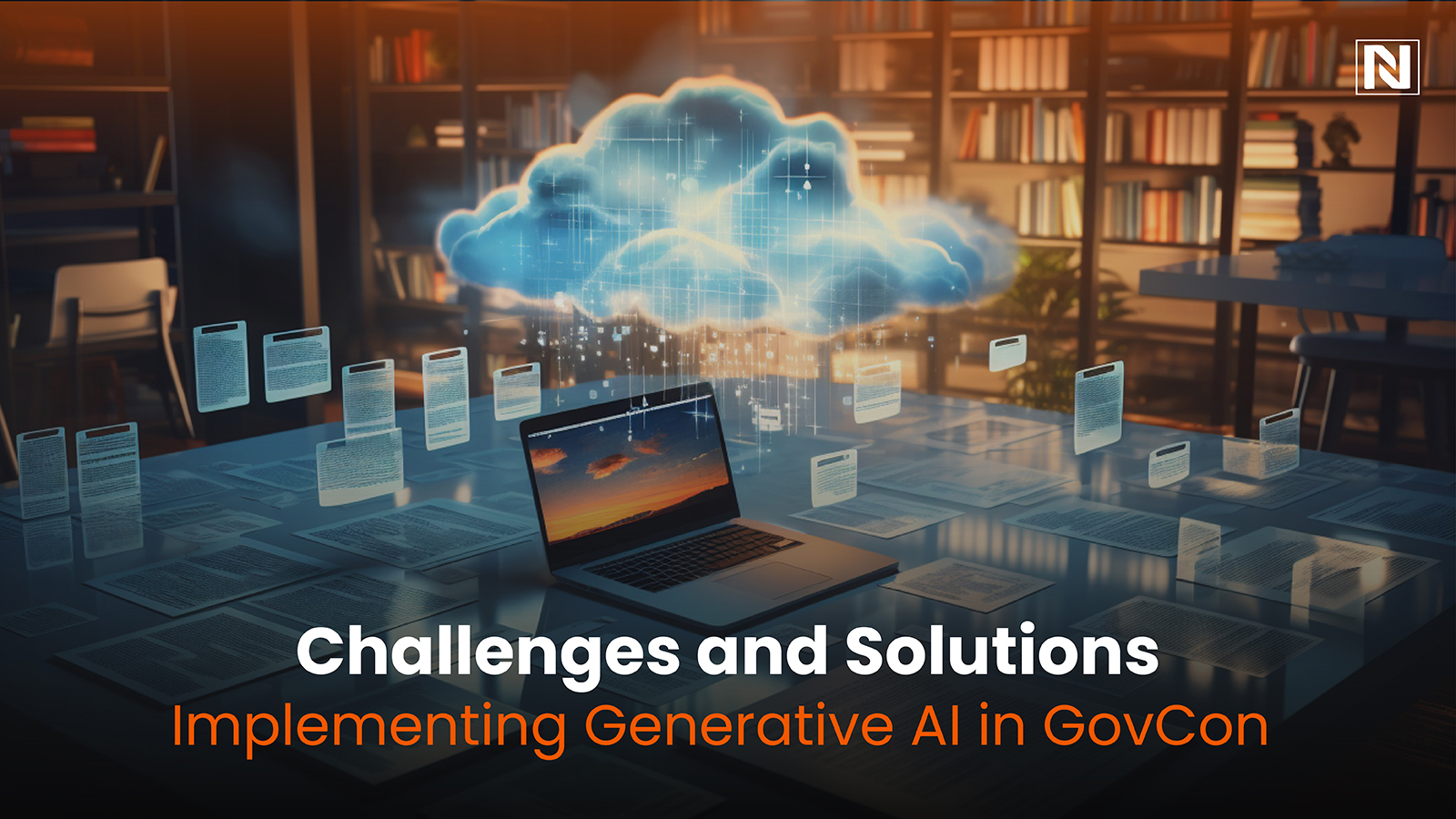
The government contracting (GovCon) sector stands at a crossroads as generative AI promises to revolutionize everything from proposal writing to compliance but adoption isn’t as simple as flipping a switch.
Between strict security protocols, ethical concerns, and the risk of biased or inaccurate outputs, many agencies and contractors are grappling with a critical question: How can we harness AI’s potential without compromising accountability or performance? The stakes are high, and missteps could mean wasted budgets, failed contracts, or even regulatory backlash.
Yet, the rewards for getting it right are too significant to ignore. Early adopters are already using AI to slash turnaround times, enhance decision-making, and gain a competitive edge so what separates success from struggle? From navigating procurement hurdles to ensuring airtight data governance, the key lies in a strategic, risk-aware approach.
The Growing Role of Generative AI in GovCon
Generative AI, powered by large language models, can automate proposal writing, streamline contract analysis, enhance decision-making, and even predict procurement risks. Its ability to generate human-like text, analyze vast datasets, and optimize workflows makes it invaluable for government contractors.
However, unlike the private sector, government AI adoption must navigate strict regulations, security protocols, and public accountability. Let’s examine the biggest challenges and how to address them.
Key Challenges of Implementing AI in Government Contracting
Implementing AI in government contracting offers significant benefits, but it also presents several challenges. Here are the key hurdles:

1. Regulatory and Compliance Barriers
Government agencies operate under stringent rules (FAR, DFARS, CMMC, etc.), making AI integration complex. Generative AI in GovCon must comply with:
- Data privacy laws (e.g., FISMA, HIPAA)
- Security clearances (handling classified or CUI data)
- Transparency requirements (explainability of AI decisions)
Solution:
- Work with legal and compliance teams to ensure AI tools meet federal standards.
- Use AI models trained on government-compliant datasets to avoid bias and security risks.
- Implement audit trails to track AI-generated outputs for accountability.
2. Data Security and Ethical Risks
Generative AI can inadvertently expose sensitive data if not properly controlled. There’s also the risk of AI hallucinating incorrect contract terms or compliance details.
Solution:
- Deploy on-premises or air-gapped AI solutions for high-security environments.
- Use fine-tuned, domain-specific models instead of general-purpose AI to reduce errors.
- Establish human-in-the-loop (HITL) review processes for AI-generated content.
3. Resistance to AI Adoption in Legacy Systems
Many agencies still rely on outdated IT infrastructure, making AI integration difficult. Contractors may also face pushback from stakeholders wary of AI-driven changes.
Solution:
- Start with pilot programs in low-risk areas (e.g., automated document summarization).
- Demonstrate ROI through case studies showing efficiency gains in procurement or compliance.
- Provide training programs to ease workforce transition.
4. Bias and Fairness in AI-Generated Outputs
If AI models are trained on biased data, they could produce unfair contract recommendations or exclusionary language in proposals.
Solution:
- Conduct bias audits on training data and AI outputs.
- Use diverse datasets that reflect equitable contracting practices.
- Implement AI fairness frameworks like NIST’s AI Risk Management Framework.
DID YOU KNOW?
The global AI governance market was worth USD 890.6 million in 2024 and is anticipated to grow at a CAGR of 45.3% through 2029.
Best Practices for Using Generative AI in Government Contracting
Successfully implementing Generative AI in GovCon requires a structured approach. Here are key strategies:
1. Start with Low-Risk, High-Impact Use Cases
Instead of replacing entire workflows, focus on augmenting human tasks:
- Automated proposal drafting (while keeping legal review)
- Contract clause analysis (flagging non-compliance risks)
- Predictive analytics for bid success rates
2. Partner with Trusted AI Vendors Specializing in GovCon
Not all AI solutions are built for government needs. Look for providers with:
- FedRAMP authorization for cloud-based AI tools
- Experience in defense and federal contracting
- Explainable AI (XAI) capabilities for transparency
3. Ensure Continuous Monitoring and Governance
AI models can drift over time, leading to degraded performance. Mitigate risks by:
- Regularly updating models with new compliance rules
- Setting up AI oversight committees within agencies
- Conducting third-party audits for fairness and accuracy
4. Upskill Government and Contractor Teams
AI is only as effective as the people using it. Invest in:
- Training programs on AI ethics and best practices
- Cross-functional AI task forces (IT, legal, procurement)
- Knowledge-sharing initiatives between agencies
The Future of AI in Government Contracting
As Generative AI in GovCon matures, we’ll see broader adoption in:
- Automated compliance reporting (real-time FAR/DFARS checks)
- AI-powered contract negotiations (dynamic term suggestions)
- Predictive procurement analytics (forecasting delays or cost overruns)
However, success hinges on balancing innovation with responsibility. Agencies and contractors that proactively address the challenges of AI in government while following best practices for using Generative AI will gain a competitive edge while maintaining public trust.
Final Thoughts
The path to integrating Generative AI in GovCon isn’t without obstacles, but the rewards of increased efficiency, cost savings, and smarter decision-making are immense.
By focusing on security, compliance, and ethical AI use, government leaders and contractors can harness this technology to revolutionize procurement while upholding the highest standards of accountability.
Frequently Asked Questions
What are the key challenges of implementing Generative AI in GovCon?
Government contractors face hurdles such as regulatory compliance, data security risks, AI bias, legacy system integration, and resistance to adoption.
How can government agencies ensure AI compliance with regulations?
They should collaborate with legal teams, use AI trained on compliant datasets, and implement audit trails for accountability.
What are the best practices for mitigating AI security risks in GovCon?
Deploy on-premises or air-gapped AI solutions, fine-tune domain-specific models, and establish human review processes for AI-generated content.
How can contractors reduce bias in AI-generated outputs?
By conducting bias audits, using diverse datasets, and following AI fairness frameworks like NIST’s AI Risk Management Framework.
What are some high-impact AI use cases in government contracting?
AI can assist in automated proposal drafting, contract analysis, bid success prediction, and real-time compliance monitoring.
